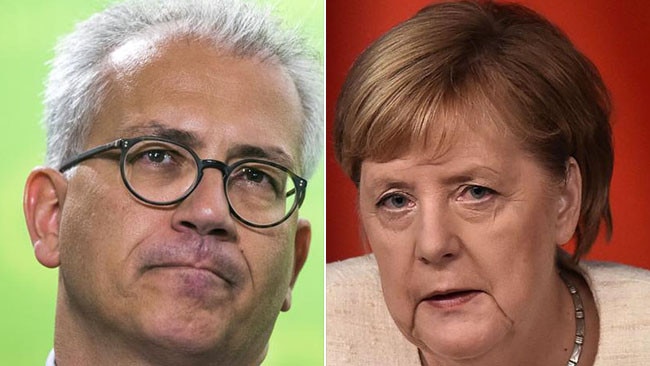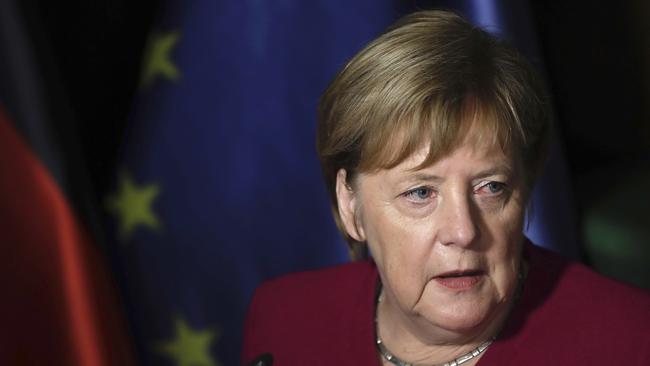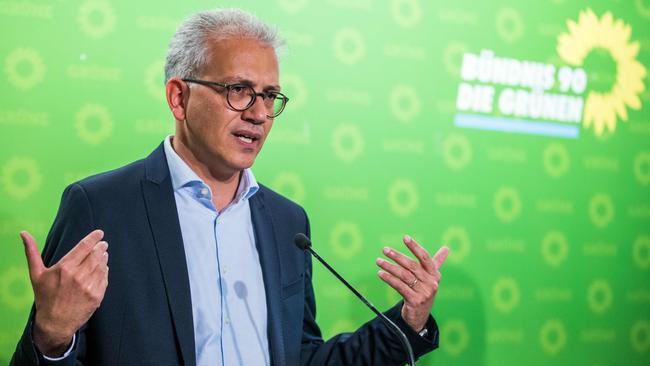German regional elections: Green’s Tarek Al-Wazir could deal blow to Angela Merkel
He looks like a staid Frankfurt banker but Greens leader Tarek Al-Wazir could deal Angela Merkel a huge blow in today’s regional elections.

Tarek Al-Wazir, in a suit, immaculate white shirt and thick-rimmed spectacles, looked like a staid Frankfurt banker as he descended the steps into a smoky dungeon nightclub called the Cave.
Yet he didn’t even blink at the sadomasochistic paraphernalia on stage — complete with an X-frame bondage cross — and soon had the crowd cheering.
Al-Wazir, whose father was Yemeni, could become minister-president of the state of Hesse in today’s regional elections, in another shock for the German chancellor, Angela Merkel.
As local leader of the Greens, he is riding a wave of enthusiasm for the party that is sweeping through Germany and transforming the political landscape.
Hesse is home to bustling Frankfurt, tranquil spa towns and the forests of Grimm Brothers’ fairy tales. A strong result here in Germany’s heartlands would confirm the Greens’ growing mass appeal, stretching from the young left-wing activists downing beers at the Cave to swathes of conservative voters deserting Angela Merkel’s Christian Democrat Union (CDU). “We are the voice of reason in a sea of folly,” Al-Wazir told the adoring crowd in the club.
While the Greens are on 21 per cent in Hesse, the CDU’s poll support has collapsed by nearly a third, to 26 per cent, signalling a second electoral thrashing this month. Their conservative partners, the Christian Social Union (CSU), were humiliated in Bavarian elections two weeks ago.

Another poor result could spell the end for the chancellor, increasing pressure on her to drop out of December’s CDU leadership vote after 13 years at Germany’s helm. It could also put Al-Wazir, 47, on the national stage. Although he spent some of his childhood in Yemen, he was born in Germany and speaks with a touch of south Hesse’s earthy dialect. Four years ago, he took the Greens into junior partnership with the CDU — a “black-green” coalition in German political argot — in the Hesse government and has been serving as economy minister.
Over that short period, support for the far-right Alternative for Germany (AfD) party has surged nationally, and Al-Wazir sees that as an opportunity. “Most people have known me for years as an economy minister and for them I’m just a normal politician,” Al-Wazir said. “But for those who want to send a strong message against the AfD, voting for a party like mine, led by someone with a name like mine, well, that could be quite satisfying.”
His rise is one snapshot of the Greens’ success. They came second in Bavaria and are polling at 19 per cent nationwide, twice their vote share in last September’s federal elections and ahead of the centre-left Social Democratic Party (SPD).
Born from radical protest movements in the 1980s, the Greens got their breakthrough in Hesse in 1985, when their former leader, Joschka Fischer, sauntered into the office wearing trainers on his first day as state environment minister, provoking horrified reactions.
Fischer went on to become Germany’s vice-chancellor and foreign minister. Thirty-three years later, Al-Wazir — in sensible black leather shoes — insists the party has not lost its radical edge.
“Maybe a sign of our success is that your footwear doesn’t reveal your politics any more,” he said. In fact, his conventional image is politically calculated: the Greens want mainstream votes.
The Green minister-president of Baden-Wurttemberg, Winfried Kretschmann, is an active member of his local church choir and rifle club, and recently published a book calling for a “new kind of Conservative”. When the Greens did so well in Bavaria’s elections this month, they were led by Katharina Schulze, a 33-year-old who relished campaigning wearing a traditional dirndl.
They stole away 6.6 per cent of Bavarian voters who had supported the conservative CSU in the last election but had tired of its strident attempts to defend itself against the AfD by tacking to the far right. That was an even bigger group than those who abandoned the CSU for the AfD itself.
The party now has mass appeal, according to Terry Reintke, 31, a Green MEP: “Our support is growing in every part of the electorate now. If you’re polling at 20 per cent nationwide, they can’t call you a niche movement any more.”

The Greens face a bigger challenge in less prosperous, eastern regions, where their support hovers at around 5 per cent, while the AfD polls in the high teens, reflecting acute anxiety about immigration. In Hesse, the AfD is at about 13 per cent and seems set to get into the state parliament for the first time.
“There is a strong mid-term-election effect, and the AfD and the Greens are the main beneficiaries,” said Frank Decker, a political scientist at Bonn University.
In the absence of a spectacular Green breakthrough in Hesse, the most probable outcome of today’s poll is what Germans call a “Jamaica coalition” - including the CDU, the Greens and the liberal Free Democratic Party — or, if the CDU does better than expected, an extension of the current CDU-Green administration.
Far from Frankfurt, however, in the conservative town of Fulda, the CDU’s voter base in its rural heartland is barely registering a pulse. On Thursday, Tina Turner’s Simply the Best echoed around a sterile conference hall shortly before Mrs Merkel arrived on stage with Volker Bouffier, the local lead candidate. A largely grey-haired audience clapped limply.
Bouffier, 66, a broad-shouldered veteran, did his best to whip up the crowd, playing up the unlikely prospect of a left-wing coalition of the Greens, the crumbling SDP and the far-left Die Linke if the CDU fails.
“Either we keep the successful model that we have in Hesse or there is a leftist alliance,” he shouted. “Those are the alternatives. Nothing else matters.”
As elsewhere, the local CDU is desperate to escape the political fallout from Mrs Merkel’s fateful decision in 2015 to open the country’s doors to more than a million asylum seekers. Its leaders would rather move on and stop talking about it.
“If people get the impression that the CDU is stuck three years in the past, then we shouldn’t be surprised by the poll numbers as they are now,” Annegret Kramp-Karrenbauer, Merkel’s protege and the CDU’s top official, insisted on Thursday.
Merkel briefly alluded to the migration issue, insisting that rejected asylum seekers must leave the country, but arguing that true Christian Democrats must help those in need.
One part of the audience clapped. A larger part just stared blankly at the stage.
THE SUNDAY TIMES


